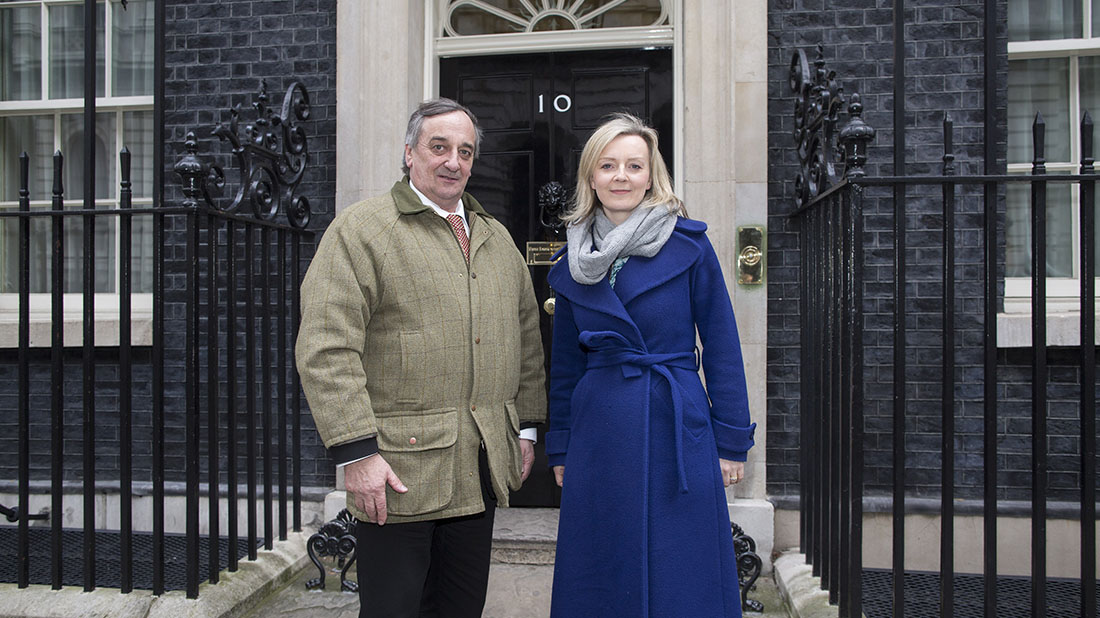
The NFU President Meurig Raymond is due to meet with the Defra Secretary of State Liz Truss today (Wednesday July 13) at the Great Yorkshire Show.
In his second meeting with Ms Truss since the EU referendum, Mr Raymond will be urging her to continue to back British farming amid a changing government.
Mr Raymond said: "Food and farming is of strategic importance to the country.
"I have already stressed to the Secretary of State that the NFU is ready and willing to work with Government to ensure we have a profitable, productive and competitive farming industry - and that work must start now.
"We must take this opportunity to build a new domestic agricultural policy that is shaped to meet our needs - a policy that allows farmers and growers to prosper while delivering the nation’s home-grown food.
"Getting the right results will take time but we need early answers to questions such as the future of support payments.
"We will be seeking guarantees that the support given to our farmers remains equal to that given to farmers in the EU.
"It will be essential that we are not disadvantaged during the future trade negotiations and government must not allow an open door policy to imports produced to lower standards.
"The Government’s approach to regulation is another key issue and members have already lost the use of neonicotinoids to control pests in oilseed rape crops.
"We now have a golden opportunity to ensure our arrangements are in future proportionate and decisions are based on sound science."
'Time to roll sleeves up and begin'
Adam Bedford, regional director at NFU North East, said it’s time to ‘roll our sleeves up and have a blank sheet of paper to craft a policy that works very well for farmers.’
Amidst the widespread political uncertainty that has followed Brexit, Adam called for assurances around issues of income, trade and regulation.
He said that the NFU was now at the beginning of the biggest farming consultation in a generation to get the policy right.
It is calling on farmers to engage and have their say to make sure the policy is right for them and their businesses in the future.
The NFU Council launched farming’s 'most significant consultation' over the impact of Brexit on agriculture and what a domestic farming policy should look like in the future outside the EU.
The agreed principles from the NFU are:
• Farmers must get the best possible access to markets in the rest of Europe. Although the UK will not be a member of the EU, it will still be a major trading partner for the foreseeable future.
• Currently the UK benefit from more than 50 trade agreements with countries in the
rest of the world. Farmers will continue to need these kind of arrangements in future, whether this means negotiating new deals or not.
• A key question we had to the Leave camp, and on which we never received a clear answer, was what kind of access would an independent UK give to imports from the rest of the world? Our requirement is that we are not open to imports which are produced to lower standards.
• During the referendum the NFU has repeatedly drawn attention to the sector’s need for access to migrant labour, both seasonal and full-time. Outside the EU farmers will need some kind of student agricultural workers scheme, which is open to students from around the world.
• Leaving the EU gives farmers the opportunity to build a new domestic agricultural policy which is adapted to British people's needs, easy to understand and simple to administer. The NFU will be looking for guarantees that the support given to British farmers is on a par with that given to farmers in the EU, who will still be the UK's principal competitors.
• The NFU says it wants to see a rural development policy which focuses on enhancing competitiveness. Britain has been a pioneer in agri-environmental schemes, but these are currently running out of steam - in part because of over prescriptive EU rules. "We must take this opportunity to devise better schemes," the NFU said.
• If there was one message which came over loud and clear in farmer meetings it was frustration with European regulation and its handling of product approvals, due to an over-politicised approach and excessive use of the precautionary principle. British farmers now have a golden opportunity to ensure arrangements are in future proportionate and based on sound science.
